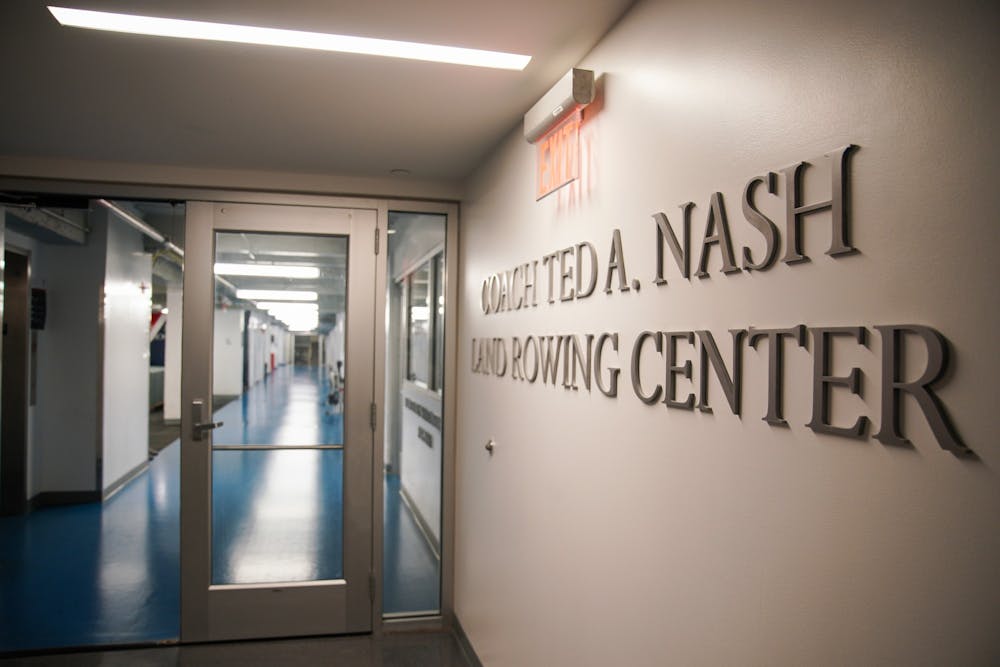Three weeks ago, former Penn rowing coach Ted Nash was accused of sexual abuse by filmmaker Jennifer Fox. Although Fox was never a student at Penn, her allegations fall into a larger conversation about sexual assault and institutional complacency at Penn.
Sexual violence is a silent epidemic touching colleges across the country. In 2019, 25.9% of female students and 7.3% of male students experienced unwanted sexual contact at Penn. The tragedy is that the vast majority of these crimes — an estimated 80% of nationwide cases — will go unreported. On college campuses, these crimes disappear from justice due to complicated Title IX policies and lack of institutional support. It often takes many years for survivors to realize justice.
Sexual assault at Penn is always relevant, but it is particularly pertinent in light of Fox’s recent allegations. Fox courageously shared her story decades after she was assaulted, naming Nash for the first time publicly, and called on Penn to rename the Coach Ted A. Nash Land Rowing Center — a room located in the basement of the Tse Sports Center, whose naming is unrelated. Nash coached men’s heavyweight rowing for twenty three years, and helped found the women’s rowing team in 1968. He died in July 2021.
Penn Athletics covered up Nash’s name with a black tarp on March 31 and has stated that it will stay covered until the results of the US Rowing commissioned investigation are known. However, the university has yet to make a public statement about its plans, if any, to permanently rename the center.
If the Nash story sounds familiar, that’s because it is. A similar naming controversy arose five years ago, after dozens of women accused trustee and alum Steve Wynn of sexual assault. Similarly, Wynn’s name was displayed prominently on campus. Both men were publicly accused, with high-profile accusations against both appearing in the New York Times. Like the Nash Center, the name Wynn Commons was almost immediately covered.
However, this is where the similarities between the Wynn and Nash controversies diverge. In 2018, the Wynn accusations were immediately addressed with university statements and action. Within days, the Board of Trustees voted to strip Wynn Commons of its namesake, giving it the name it still bears: Penn Commons. Yet, today, two weeks after a very public allegation against Nash, the University has failed to take action to rename the Ted A. Nash Rowing Center.
Five years ago, at the height of the #MeToo movement, Penn acted remarkably swiftly to resolve its Wynn controversy. On Jan. 27th, 2018, the Wall Street Journal reported dozens of accusations against Wynn. On Jan. 30th, Wynn Commons was defaced with black paint. A day after this anonymous graffiti, the Penn Board of Trustees Executive Committee met via a conference call to discuss renaming Wynn Commons. And on Feb. 6, 2018 — ten days after the allegations against Wynn were published — President Amy Gutmann and the Board of Trustees Chair announced that Wynn Commons would be expeditiously renamed.
Five years ago, Gutmann cited that the “nature, severity, and extent” of the allegations against alleged abuser Wynn were enough to warrant renaming the campus space with his name. While these are vague reasons, this statement set a precedent for Penn to take quick responsibility in rethinking its ties to affiliates.
Granted, this is not a problem unique to Penn. Across the Ivy League, institutions struggle to reconcile their ties to their past. Proponents of renaming cite that names hold power, valorizing people who were abusers, white supremacists, or racists.
At peer institutions, student pressure drove their administration to take action. At Yale, students’ activism led to the renaming of Calhoun College, named after a man with vicious ties to slavery. At Princeton, administration ceded to high-pressure student protests and renamed its Wilson School. Today, Penn again finds itself in the midst of a larger societal debate, facing negative media attention.
Today, a lack of transparency leaves students wondering about Penn’s naming, and renaming, process.
Penn’s official policy is that the president holds the “discretion" and "authority” to rename a building, part of a building, or campus space depending on the circumstances. The renaming of Wynn Commons in 2018 shows us what the University views as appropriate circumstances for prompt action.
However, this discussion occurred in a closed meeting. As per custom, most trustee meetings occur in private. In a thirty-minute conference call in 2018, the Board of Trustees Executive Committee resolved to rename Wynn Commons. Their exact deliberations, including what circumstances threaten the “reputation and standing of the University,” will be forever unknown. This lack of transparency leaves today’s students guessing as to what circumstances qualify the renaming of campus spaces.
The discrepancies between the Wynn and Nash situations highlight a current lack of administrative urgency and a continual lack of transparency. As of April 13, 2023, neither the president nor the Board of Trustees has released a public statement regarding Fox’s allegations. If Penn follows their past precedent, students should expect little transparency regarding the Nash Center deliberations.
While sexual crimes are often invisible, campus spaces named after abusers are not. Names hold power. Penn owes it to Fox, as well as its student body, to publicly address the Nash Center controversy. Penn showed us in 2018 that it is capable of swiftly renaming campus spaces.
We ask our Board of Trustees: where is your action today?
Editor's Note: Previously, the DP indicated in this article that the Coach Ted A. Nash Land Rowing Center and Wynn Commons — now renamed to Penn Commons — are buildings on campus. The column has been updated to clarify that the Coach Ted A. Nash Land Rowing Center is not a building, but rather a center located in the basement of the Tse Sports Center. Wynn Commons — now renamed to Penn Commons — is a campus space, not a building.
Editorials represent the majority view of members of The Daily Pennsylvanian, Inc. Editorial Board, which meets regularly to discuss issues relevant to Penn's campus. Participants in these meetings are not involved in the reporting of articles on related topics.









